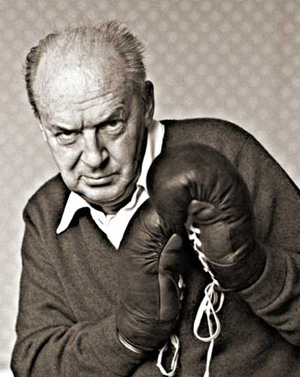When I visited Ann Pasternak Slater last fall, I asked if her husband, the writer Craig Raine, might have a copy of the famously blistering review he wrote of Joseph Brodsky‘s poetry. I say “famous,” but my efforts had failed to uncover any copy of the review in any library. He hadn’t, but some weeks later she wrote that he had suggested I look up the review in his 500+ page book of essays, In Defense of T.S. Eliot. Feeling a little rebuffed, I nevertheless found a copy of the book in Stanford’s Green Library, and I must say that he’s rather won me over, on every subject except Brodsky.
This paragraph, in particular, from the essay “A Book that Changed My Life,” about finding Vladimir Nabokov‘s Lolita as a 14-year-old boarding school student in 1959:
 “I settled to read this dirty book – undeceived by the international tributes to Nabokov’s art which were anthologized at the back – and was at once bouleversé by the first paragraph, which had, as it turned out, a particular personal message from Nabokov to me. It was this: the word has a life of its own, a sound of its own and a shape of its own. It isn’t simply a harmless drudge, it is also a monarch with a retinue of associations. It lives in the kingdom of the mouth and the mind. If it is to obey you, you must cherish it as an individual and respect its unique powers and properties. Every word is irreplaceable, as Roget paradoxically but invariably demonstrates.”
“I settled to read this dirty book – undeceived by the international tributes to Nabokov’s art which were anthologized at the back – and was at once bouleversé by the first paragraph, which had, as it turned out, a particular personal message from Nabokov to me. It was this: the word has a life of its own, a sound of its own and a shape of its own. It isn’t simply a harmless drudge, it is also a monarch with a retinue of associations. It lives in the kingdom of the mouth and the mind. If it is to obey you, you must cherish it as an individual and respect its unique powers and properties. Every word is irreplaceable, as Roget paradoxically but invariably demonstrates.”
Coincidentally, today’s Washington Post announced the death of 77-year-old Dmitri Nabokov, the author’s son, whose position as heir inevitably meant much of his life was spent protecting his father’s literary legacy and translating and editing his father’s plays, poems, stories, including the novella The Enchanter and the Selected Letters.
“My father is gradually marching — with his two favorite writers, Pushkin and Joyce — arm in arm into the pantheon to join the greatest of all, Shakespeare, who is waiting for them,” Nabokov told The Associated Press in a 2009 interview. “I like to think that I did my bit to keep things on track.”
Tags: "James joyce", Alexander Pushkin', Craig Raine, Dmitri Nabokov, Vladimir Nabokov, William Shakespeare

